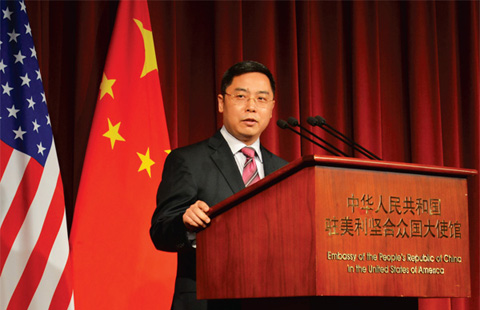Startups return to China to battle pollution
Updated: 2015-06-06 01:09
(China Daily USA)
|
||||||||
Return to China
Like Sun, the two other young men on his team also quit their recent jobs in Silicon Valley and returned to China. The chief technology officer, with a dual master's degree in mechanical engineering and electrical engineering from Stanford, had worked at Apple Inc in charge of iPhone electrical-circuit system design. The CEO, with a PhD in robotics and pattern recognition from the University of Illinois at Urbana-Champaign, had worked at Western Digtal.
"The job is stable and the life is comfortable [in the US], but the career potential is limited," said Sun. "In a big firm, we are responsible for only a tiny part of the whole operation, but in our own startup, we have the power to control the company's direction, and maybe the direction of the entire industry. What's more, we would feel a better sense of accomplishment if our knowledge and technology can benefit our homeland and people."
What attracts the Silicon Valley entrepreneurs is not only the career potential but China's huge market. However, China's technologies in such areas lag behind and an effective instrument takes years of design and testing, so China's environmental agencies have to purchase monitoring equipment from foreign companies, such as the US multinational Thermo Fisher, which has built a substantial presence in the Chinese market, according to Sun.
Carl Wang said China's promotion of innovation and mass entrepreneurship accelerated his return to China. "We received a few offers from Shanghai's innovation park, but we are considering Beijing as its environment for a startup is more mature and the Beijing-Tianjin- Hebei cluster has been made a priority," he said.
To attract more overseas Chinese professionals to return home, some major innovation parks are underway in Beijing, such as the 10-square-kilometer Future Science & Technology Park, which is expected to lead China's applied science and technology and innovative entrepreneurship, as well as Zhongguancun Science & Technology Zone and 16 other high-tech parks, covering a total of 488 square kilometers across the municipality.
In Shanghai, such innovation parks are also stepping up efforts to woo overseas Chinese talents back home. Sun, whose team settled down in Jiading Industrial Park in Shanghai, said all they met was green lights. "The park offered us a 400-square-meter office venue for free and 600,000 yuan (about $100,000) of subsidy a year," he said. "We are also allowed to eat at the cafeterias of the nearby police department and revenue bureau."
Early this year, China's state council announced a commitment of 40 billion yuan ($6.66 billion) for a national entrepreneurial investment foundation for emerging industries to support innovation and startups.
The domestic demand and the government's support both play a role in attracting overseas environmental talent back home, said Xin Yuan, who is vice-president of the Chinese Environmental Scholars and Professionals Network (CESPN), founded in 2007 in the US by a group of Chinese scholars and professionals studying and practicing environmental science and engineering in North America and Europe.
"One of our organization's missions is to help professionals start up their own projects in China," said Yuan, who is also a New York-based senior environmental analyst. "In the past three or four years, almost half our members have returned to China."
"An increasing number of Chinese students have come to the US to study environmental science or engineering. Many of them returned to China directly after graduation and some of them chose to work in the US so that they could accumulate necessary experience before launching their own startups in China," he said.
CESPN has more than 1,000 members and around 6,000 followers on their Weibo account and forum website. They are from academia, government agencies and enterprises or non-profit organizations.
CESPN also partners with the Jiangsu (Yixing) Institute of Environmental Industry (JIEI), a nonprofit organization promoting environmental industry with technology and information support, to bridge the channels for overseas talent and Chinese environmental enterprises. The institute was established by the Yixing Industrial Park for Environmental Science and Technology, which is considered the birthplace of China's environmental industry in the 1970s, and is home to more than 1,000 enterprises now.
A wave of startups
"We noticed a wave of startups in the past one or two years," said Gao Song, vice-president of the institute. "Unlike the traditional enterprises, these startups cover a variety of areas, ranging from polluted soil and water to mud flat garbage."
"The traditional environmental industry mainly focused on manufacturing and the projects were usually used to deal with the government's inspection," he said. "Now the industry is transforming from policy-driven to societyand innovation-driven, which will greatly accelerate the industry's development."
Last month, Gao's institute launched a global innovation competition with the aim of promoting sustainable development of the environmental industry. So far, 200 teams from China and abroad have presented their projects to juries composed of venture capital firms, angel investors and successful entrepreneurs.
"The industry is in great need of overseas talents with complete professional training and they are expected to bring back advanced technologies as well as operational methods," said Gao. "The operations in China have traditionally been based on experience, but in advanced countries the practice is based on data modeling. Currently, computer software has not been widely used in China's environmental industry."
Chinese Premier Li Keqiang proposed the "Internet Plus" strategy in March to stimulate new economic growth by focusing on Internetpowered startups and the application of new technology to traditional sectors.
The "Internet Plus" was going to be an inevitable trend to integrate the Internet, cloud computing and big data with the environmental industry, Gao said.
That's why startups like GAGO, He-sai Photonics Technologies and Equota Energy are favored by investors. "If you have good technology, you don't worry about investment," said Carl Wang, who had just scheduled a conference call with an investor in Shanghai.
Kai Sun agreed. "We have turned down over 10 investment offers," he said, declining to reveal the amount of funding they had secured.
In the past three years, an additional 100 billion yuan has been invested in the environmental industry each year and China still needs tremendous investment in the next few years, which is estimated at 8 trillion yuan to 10 trillion yuan, said China's Minister of Environmental Protection Chen Jining during the NPC in March.
In 2013, the State Council set a goal of increasing the environmental industry output to 4.5 trillion yuan by the end of 2015 and making the environmental industry the pillar industry of the national economy. The government expects to stimulate consumption demands by promoting energy-conserving and environmental products, as well as increase social investment by enhancing engineering competence. Contact the writer at liazhu@ chinadailyusa.com
ENVIRONMENTAL LAW: NOT A ‘COTTON SWAB'
China's new environmental protection law, which became effective on Jan 1, is considered the strongest ever.
It replaces limits on fines for polluting factories with daily fines until the pollution stops. Under the amended law, local officials may be demoted or sacked if found guilty of covering up pollution or other environment- related wrongdoing.
Environmental authorities also have more power to detain managers of polluting factories for 15 days if they don't complete environmental impact assessments or their plants continue to pollute despite warnings. The law also stipulates that offenders will be held criminally accountable for their behavior.
Since taking effect, the biggest fine was issued in February against a power plant by an environmental authority in the Xinjiang Uygur Autonomous Region: 2.08 million yuan ($335,133) for discharging pollutants beyond the allowed limit.
Compared with the environmental protection law passed in 1989, the new one shows the government is addressing environmental issues in the ecosystem, said Gao Song, vice-president of the Jiangsu (Yixing) Institute of Environmental Industry."
In the past, violating the environmental law cost very little. It didn't make much difference if you polluted for one day or for a month," he said. "Now the factories will have to seek solutions from advanced technologies and management in order to meet the law's requirements."
He said there will be challenges to implementing the new law because some local authorities aren't fully prepared to enforce it. "On the other hand, the new law can serve as a sharp weapon to help raise the whole society's awareness of pollution and ultimately promote the cause of environmental protection," he said.
Last March, Chinese Premier Li Keqiang said during the annual National People's Congress (NPC) that the government would "resolutely declare war against pollution as we declare war against poverty."
He said at a press conference at the end of the NPC session that strict enforcement of the new law would be a focus of environmental-protection efforts this year, and the cost for those involved in the illegal production and emission of pollutants would be too high to bear.
"The environment protection law is an ultimate weapon instead of a cotton swab," he said.
- Rescuers enter Eastern Star hull in search efforts
- China mourns Yangtze shipwreck victims as search continues
- 9.42 million students sit national college entrance exam
- Students prepare to take national college entrance exams
- TV giants suspend shows for ship wreck mourning
- China, Japan reopen finance talks after delay over sour relations
- Turks vote in election set to shape Erdogan's legacy
- Protesters block road to G7 summit site
- India, Bangladesh sign historic land boundary agreement
- Putin says no need for West to fear Russia
- MERS cases rise to 50 in S.Korea with 9 more infections
- Eleven hikers killed in Malaysia quake, eight still missing

 Rescuers mourn victims on seventh day since Eastern Star disaster
Rescuers mourn victims on seventh day since Eastern Star disaster
 Rescuers enter Eastern Star hull in search efforts
Rescuers enter Eastern Star hull in search efforts
 Gaokao held across China
Gaokao held across China
 Man sues actress for staring at him
Man sues actress for staring at him
 Students prepare to take national college entrance exams
Students prepare to take national college entrance exams
 Across America (May 29- June 4)
Across America (May 29- June 4)
 Operation underway to turn the ship over
Operation underway to turn the ship over
 Prayers held for ship passengers
Prayers held for ship passengers
Most Viewed
Editor's Picks

|

|

|

|

|

|
Today's Top News
Heavyweight Zhang wins unanimous decision
China mourns Yangtze shipwreck victims as search continues
China signs $50m agreement with FAO to support developing countries
9.42 million students sit national college entrance exam
Death toll jumps to 396
as hopes of finding any
survivor in cruise fade
China, Japan reopen finance talks after delay over sour relations
Hacking claim isn't responsible, Beijing says
Startups return to China to battle pollution
US Weekly

|

|






